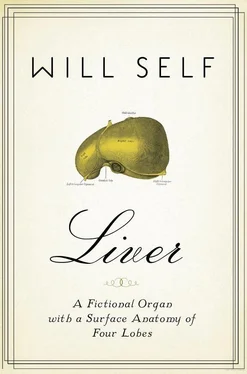When the Tosher was in town he toshed all day at his studio, which was above a sanitary-ware manufacturer in Peckham Rye, fuelled only by successive glasses of champagne. Then, in the late afternoon, he applied his polish, lacquered his hair into a hard helmet and went up to the Plantation, where he stood by the door and drank champagne. Cunty, darling.
Without the Tosher, the other members would have been mere mudlarks grubbing on the foreshore for trinkets discarded by the Truly Significant as they swept past on their gilded barges, heading downstream to the silvery sea of posterity. Without Trouget their ossified mores would have been a stylization that had forgotten style. Trouget — by virtue of his great success alone, for he was as daft as one of his own brushes — belonged to the world without; a world that was steadily growing faster and brighter, while in the club it only grew slower and dustier.
‘Are you well hung, cunty darling?’ Val asked him on this particular day. The Tosher murmured an affirmative. ‘It’s all in the hang , isn’t it, Tosher?’ Val continued. ‘I mean, if your daubs ain’t hung just so, no cunt’ll buy ’em.’
Again, Trouget’s weird young-old face contorted consent. The world-famous artist suddenly spasmed forward, pecked a few peanuts from the bar and popped them into his mouth. He brushed his fingertips on the flanks of his jacket; the grains of salt fell to the carpet, poisoning the peaceful fields of dust.
Val took another line: ‘Have you got our cunt-boards? And are our names on the silly list? You know I can’t be doing with a wait.’
Trouget dropped his weak chin to his strongman’s chest.
The Boy, who had been tidying up the bottles of Britvic orange beloved of the Martian, couldn’t prevent himself from breaking in at this point: ‘Um, T-Tosher, c-can I come, too?’
Over the years Hilary had lost any awe he may have once had in the presence of the others, who, while they were hopeless sots, were none the less what his mother quaintly referred to as ‘your betters’. But with Trouget, Hilary was still tongue-tied; and this despite the fact that the painter had once, very civilly, asked Hilary to beat him with a small hammer, the kind railway engineers formerly used to check tappets. More of that, never.
Val, outraged, froze: his Embassy aloft, his claw gripping the till, as if it might give him the strength of money.
Had you, for the past two years, been spending all afternoon, every day, in the Plantation, you probably wouldn’t have noticed the changes in Val — the changes, specifically, in his nose. The spider angioma was far more advanced: ruptured blood vessels now entirely enmeshed his fleshy beak in a net of angry bluey-red lines.
The sight was so arresting that newcomers to the club — of whom, admittedly, there were few at this time — would be altogether transfixed by the nose as it shone, a warning buoy bobbing in the whirlpool of booze. If, at some later date, these neophytes were asked about their visit to Soho’s oldest and most celebrated private members’ club, they would only ask in return: ‘That man who says ‘‘cunt’’ all the time, what’s wrong with his nose?’ As if you would know.
It was comforting to think of Val Carmichael’s nose as evidence of bad character — each bloody filament a wrong choice or an evil deed — but the truth was far sadder, and more desperate. True, Val had not been exactly nice to begin with, but for a long time now it had been the nose that was lighting his way into the most Stygian recesses of human nature.
The nose burnt with unholy indignation.
Trouget said nothing, then unzipped his jacket and, withdrawing a thick deck of engraved invitations, dealt one on to the bar in front of the Boy. It read Trouget 1955–1985, A Retrospective at the Hayward Gallery , then the usual guff. The Tosher didn’t stop there: he went on from place to place, silently dropping invitations into the hands and the laps of the members. It was a fait accompli; however much the ugly old sister hated it, the Fairy Godmother had decided: Cinders would go to the ball.
In the Methuselan lifespan that it was taking for Val’s indignation to subside into resignation, the Martian rose and slowly scuttled the five steps to the bar. ‘Have a drink, Val,’ he cautioned him. ‘On me — Boy, get Val a V & T, a triple, I think.’
‘She, she, sheeeeoooo.’ Val’s attempt to become the screaming pope and excommunicate Hilary ended with a sound the members had never heard before: his sighing. Hilary, who had been holding his own bad breath, at last managed to swallow.
This time they didn’t make the mistake of walking. Even so, when the two cabs pulled up on Belvedere Road, and the ten members of the Plantation party struggled out into the summer evening, they found the light and the noise and the air and the people almost overwhelming.
His Nibs, who had more cause to venture outside the square mile of the West End than the rest, took the lead. Yet even he, once they had entered the labyrinth of stairwells and walkways that corrugated the cardboard Brutalism of the South Bank, was altogether bamboozled.
McCluskey halted and looked back. Coming up behind him, arm in arm, were Val and the Boy; while to their rear limped the rest of the members: defeated Tommies retreating across a concrete no man’s land. At the very back was the Martian, one hand on each of Her Ladyship’s buttocks so that he could propel her forward.
His Nibs was oft times precluded from deep insight — by reason of alcohol, of course, and also for professional reasons: so much of his intellect was adapted to the secretion of shmaltz — the heating up of it, and then its smearing across the tabloids — that he had lost his nose for what might, or might not, be kosher.
The Boy, almost a decade on now, had reached a peculiarly affecting stage: plump and dazed, subject at least once or twice a week to blackouts, his suffering lending his thin nose and flabby cheeks a kind of nobility.
McCluskey was no gastronome; he knew neither of the iecur ficatum — the livers of geese force-fed with figs — originated by Apicius, nor of the manner in which the medieval European Jews had, as a by-product of their own dietary laws, preserved the practice of gavage . Nevertheless, observing the Boy and his tormentor, His Nibs grasped that what existed between them was no Beckettian stalemate; and that no matter the extent to which the Plantation and its members were outside time, there was still a linear process at work here, one that, no matter how haltingly, was limping towards some strange fruition.
According to Pliny the Elder, when the Romans’ geese were fat enough, they were drenched with wine and immediately slaughtered. In Hilary Edmonds’s case the drenching was taking years, and His Nibs now realized that the only thing that might prevent his eventual demise was the saturation and slaying of the poultry keeper himself.
McCluskey was not the only one to be granted insight on the night of Trouget’s triumphant retrospective. (The prices paid for the Tosher’s canvases quadrupled in the first few days of the show, while he was levered from a position of undoubted avant garde pre-eminence to a pedestal of Portland stone. The OM was spoken of — and we’re not talking Buddhist chants here.) In the topsy-turvy galleries of the Hayward — spaces at once airily vast and oppressively claustrophobic — some hundred and fifty of the Maî tre’s mighty oils loomed and brooded, deepening the mystery.
Trouget’s brushwork may have changed over three decades, from the smooth viscosity of Léger to the scraggy abrasion of Kokoschka or Jasper Johns, but his fidelity to his palette and his subject matter was absolute. In picture after picture, using his favoured bile-greens and bathroom-tile blues, Trouget portrayed well-built nudes, willowy youths and neotenous golems, their heads part skull, part the melted plastic of dolls. There were also a lot of dogs — cartoonish and naturalistic.
Читать дальше












